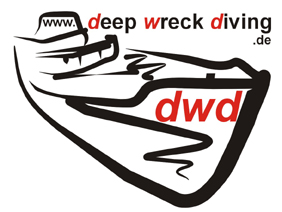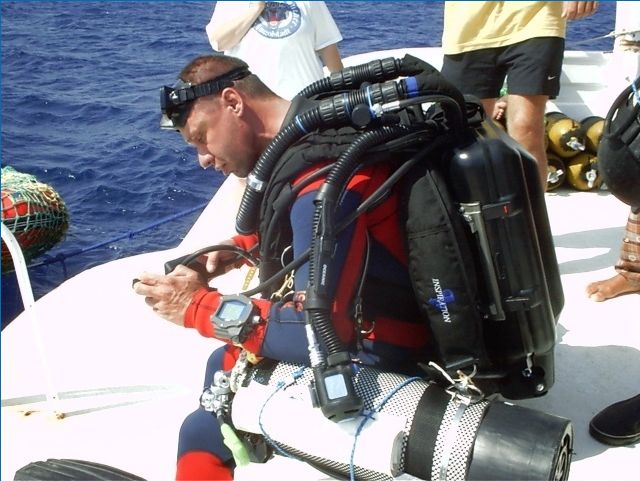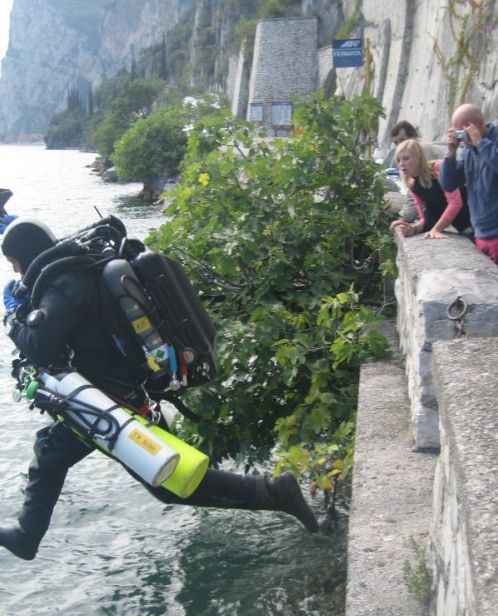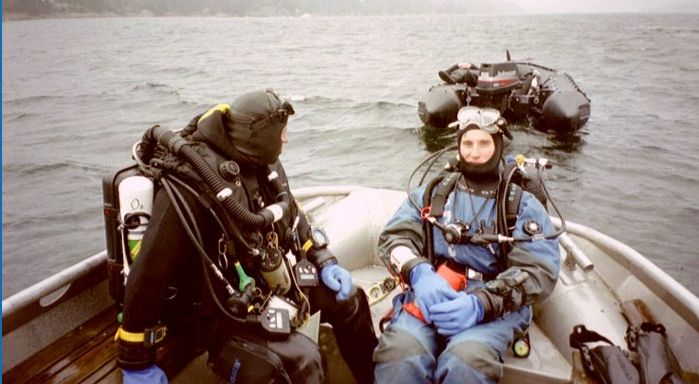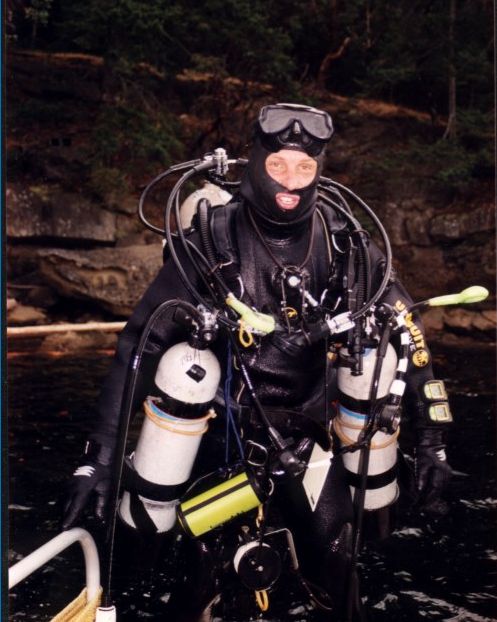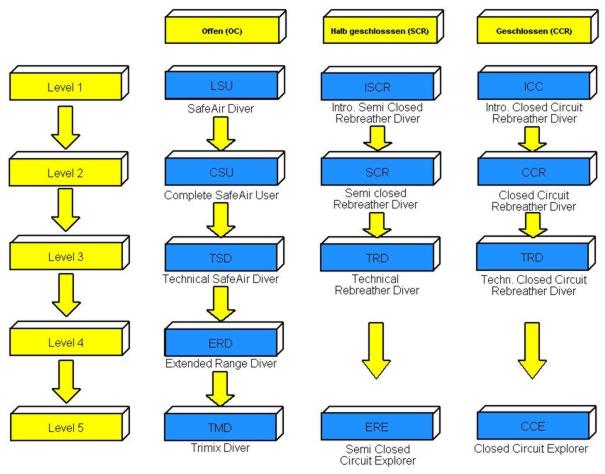
dwd – deep wreck diving was founded on October 1, 2005 by Helmuth Biechl. Based on 35 years diving experience and more than 30 years diving education & training according to the standards and guidelines of ANDI, PSAI, CMAS, SSI and PADI, we wanted to create something very special within the diving community. Our objective was to establish a blend of technical diving training facility, expedition to and exploration of deep wrecks as well as deep wall diving in our home waters. These three aspects are the essence of dwd – deep wreck diving.
|
|
|
|
We train primarily according to the ANDI (American Nitrox Divers
International) standard, one of the oldest and widely recognized
organizations for technical diving. While our main focus is in the
area of technical dive training and education, we also engage in
recreational diving education; predominantly for those trainees who
exhibit more ambitious goals and would like to submit themselves to
more intensive dive training. |
|
|
|
Expedition and exploration diving with the primary goal of diving
deep and often virgin wrecks in all parts of the world is usually
performed by an international team. All participants can draw from
long experience in Deep Wreck Diving. |
|
Helmuth Biechl has been diving since 1975. Accompanied by the local lighthouse guard Raimondo, he did his first open water dives in Linosa, a small island south of Sicily. Prior to that he had snorkeled the Mediterranean for many years with just basic equipment - mask, snorkel, fins, weight belt, and knife (an essential piece of diving equipment at the time). In 1979 he became the youngest diving instructor at the lifeguard facility, which he performed intensively for the next 10 years. At the same time he became a member of the special diving squad, an elite team of the disaster management unit, deployed for deep water rescue and recovery operations. Early on Helmuth Biechl was interested in the educational side of diving and began his professional diving career as an instructor with one of the first diving facilities in Munich (Tauch Bertl). Since then he had been committed to diving education and taught during the following years at all levels for CMAS, SSI, and PADI. In 1984 as TL*** he was appointed to the Diving Educations Committee of the VIT (Verband Internationaler Tauchschulen) and actively participated locally and abroad in instructor seminars and exams as a speaker as well as an instructor trainer. Helmuth Biechl was always attracted by niche areas of the diving industry. In 1987 he completed a hardhat diving course in the Baltic Sea and dived for many years with his own hardhat equipment. He had already acquired his own oxygen rebreather (Dräger LAR 3) in 1980, which was not a trivial task at the time. A couple years later he became the proud owner and user of the legendary “Leutnand Lund II” rebreather. He dedicated many years to the application of DPVs (diver propulsion vehicle, Aquazepp) and explored this way the Bavarian lakes, Gianutri (Italy), Gozo (Malta) and Lipari (Sicily) to extended ranges and depths. He started early to organize diving safaris and trips into the Mediterranean, the Red Sea and the Maldives. Privately he dived the Bavarian lakes and the Mediterranean Sea with his own rubber dinghy or Sailboat. From the beginning he was especially interested in extreme deep diving, which frowned upon at the time. In 1998 after reading the book “Technical Diving – Tauchen am Limit” by Mario Weidner he began technical diving, especially deep diving with trimix. At ANDI (American Nitrox Divers International), one of the largest commercial organizations for technical diving, he was trained predominantly by Harry Wenngatz from Canada, an internationally known pioneer of the first hour. Later on he became an ANDI instructor for technical diving, first for nitrox and ultimately for trimix. Over the last couple years Helmuth Biechl taught technical diving at all levels, for users as well as instructors. Today he is a trimix instructor trainer for open circuit, semi-closed and closed circuit systems, as well as technical wreck diving, solo diving and cavern diving. Since December 2005 Helmuth Biechl has been country director at ANDI Europe and responsible for consulting diving facilities and instructors in Germany. In february 2007 he was appointed as Instructor Trainer Director (ITD) and with this he is a permanent member of the highest committee within ANDI. In april 17, 2007 he became a shareholder of ANDI Europe and since this date he holds the position of the Training Director. In 2001 he began to dive intensively with modern rebreather systems; first with the SCR Dolphin from Dräger, then with the CCR Inspiration of the British manufacturer Ambient Pressure Diving (APD). Subsequently he added the CCR Classic Kiss from Jetsam, the CCR Megalodon from Innerspace, the PASCR RON from RON-GER, the mCCR rEvo, the Hammerhead CCR from Juergensen Marine and the COPIS from Innerspace. The intrinsic motivation for trimix diving was the exploration of Deep Wrecks in all parts of the world. Since the year 2000, his entire interest has been dedicated to Deep Wreck projects. Helmuth Biechl dives in international teams with the best wreck divers in the world, from England, Ireland, Scotland, France, Italy, Malta, Poland, USA and Canada. In the future he wanted apply himself even more to the exploration of extremely deep wrecks, laying at the threshold of mixed gas diving. Doing so, he dived in September 2005 together with Michael Klemm and Jean-Marc Belin the deepest wreck in southern France, the Natal in 130m. In June 2006, together with Tom Jaspers and Roberto Bordin, he dived the Calino in 150m near Capri/Italy. In August/September 2007 he had the opportunity to dive together with the world’s best wreck divers to the remains of the Carpathia in the North Atlantic (250sm offshore) in 155m depth. The total dive time of each of the three dives was six hours. The RMS Carpathia is one of the most famous wrecks in the world. The passenger steamship came to aid of the Titanic in 1912, but was unfortunately sunk by a German torpedo of U-55 in 1918. Helmuth Biechl is currently working on plans to dive even deeper wrecks beyond the 160m mark. Helmuth Biechl started cave diving in 1979 on the Medas islands in Spain and became a full cave diver with NACD (National Association of Cave Divers) in 2000. On average he has completed about 100 dives a year since 1977 and looks back at about 3000 logged dives. |
|
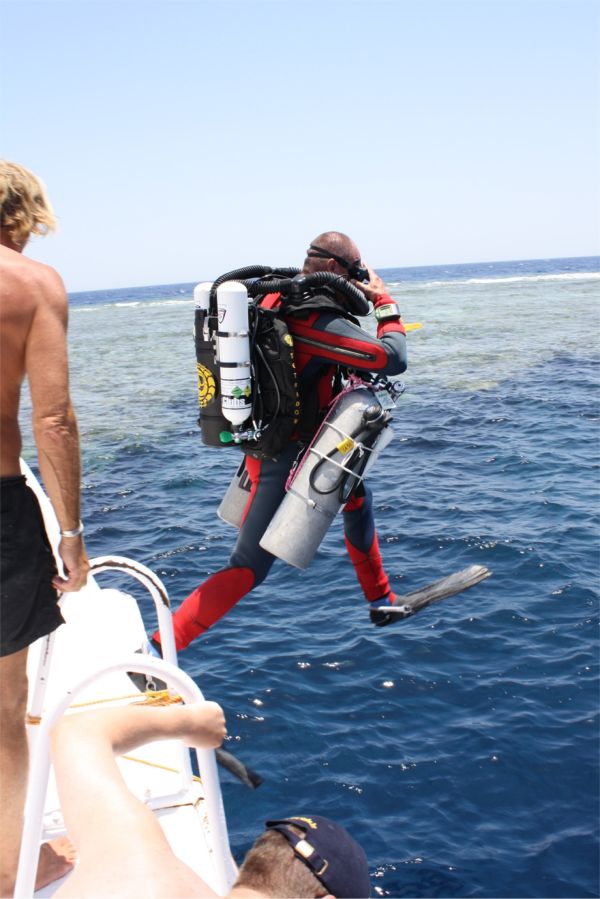 |
|
|
|
|
